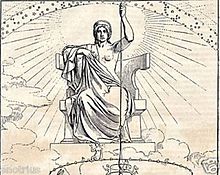Ananke (mythology)
| Ananke | |
|---|---|
| Personification of Necessity and Inevitability | |
| Member of the Primordial Gods | |

|
|
| Other names | Adrastea |
| Symbol | Torch, Spindle |
| Consort | Chronos |
| Parents | Hydros and Gaia |
| Offspring | Chaos, Aether, Phanes, Erebus, The Moirai |
| Roman equivalent | Necessitas |
In ancient Greek religion, Ananke (/əˈnæŋkiː/), also spelled Anangke, Anance, or Anagke (Greek: Ἀνάγκη, from the common noun , "force, constraint, necessity"), is a personification of inevitability, compulsion and necessity. She is often depicted as holding a spindle. One of the Protogenoi, Ananke marks the beginning of the cosmos, along with her father and consort, Chronos (Chronos protogenos — not the Titan Cronus). She was seen as the most powerful dictator of all fate and circumstance which meant that mortals, as well as the Gods, respected her and paid homage. Considered as the mother of the Fates according to one version, she is the only one to have control over their decisions (except, according to some sources, also Zeus).
According to the ancient Greek traveller Pausanias, there was a temple in ancient Corinth where the goddesses Ananke and Bia (meaning violence or violent haste) were worshiped together in the same shrine. Ananke who represents Fate or Necessity or Force is frequently identified or associated with Aphrodite, especially Aphrodite Ourania who represents celestial Love, as the two are considered two sides of the same power that dictates life. Her Roman counterpart is Necessitas ("necessity").
"Ananke" is derived from the common Ancient Greek noun (Ionic: ἀναγκαίη anankaiē), meaning "force, constraint or necessity." The common noun itself is of uncertain etymology.Homer refers to her being as necessity, often abstracted in modern translation (ἀναγκαίη πολεμίζειν, "ιt is necessary to fight") or force (ἐξ ἀνάγκης, "by force"). In Ancient Greek literature the word is also used meaning "fate" or "destiny" (ἀνάγκη δαιμόνων, "fate by the daemons or by the gods"), and by extension "compulsion or torture by a superior." She appears often in poetry, as Simonides does: "Even the gods don’t fight against ananke".
...
Wikipedia
